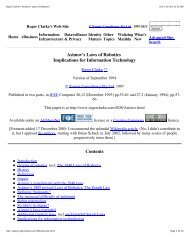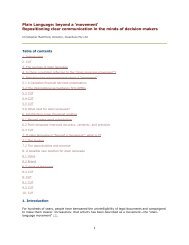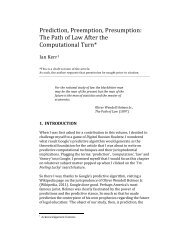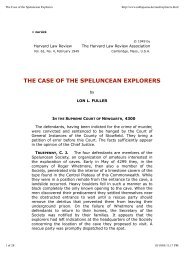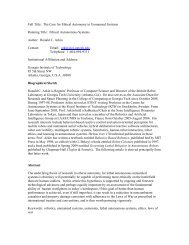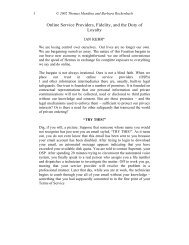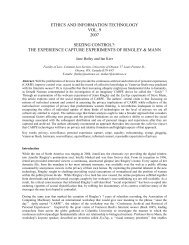Materializing Morality: Design Ethics and Technological Mediation.
Materializing Morality: Design Ethics and Technological Mediation.
Materializing Morality: Design Ethics and Technological Mediation.
Create successful ePaper yourself
Turn your PDF publications into a flip-book with our unique Google optimized e-Paper software.
Verbeek / <strong>Materializing</strong> <strong>Morality</strong> 379<br />
in STS <strong>and</strong> in the philosophy of technology, reveals that designing should<br />
be regarded as a form of materializing morality. This implies that the ethics<br />
of engineering design should take more seriously the moral charge of<br />
technological products <strong>and</strong> rethink the moral responsibility of designers<br />
accordingly.<br />
Notes<br />
1. The text of this section is a reworked version of a section in P. P. Verbeek (forthcoming).<br />
It can be seen as a summary of the analysis of technological mediation as developed in<br />
Verbeek (2005).<br />
2. Ihde (1990) also distinguished two relations that do not directly concern mediation.<br />
First, he identified the “alterity relation,” in which technologies are the terminus of our experience.<br />
This relation, which mirrors Heidegger’s “presence at h<strong>and</strong>,” occurs when interacting<br />
with a device as if it were another living being, for instance, when buying a train ticket at an<br />
automatic ticket dispenser. Second, Ihde discerned the “background relation.” In this relation,<br />
technologies play a role at the background of our experience, creating a context for it. An<br />
example of this relation is the automatic switching on <strong>and</strong> off of the refrigerator.<br />
References<br />
Achterhuis, H. 1995. De moralisering van de apparaten. Socialisme en Democratie 52 (1): 3-12.<br />
———. 1998. De erfenis van de utopie. Amsterdam: Ambo.<br />
Akrich, M. 1992. The de-scription of technological objects. In Shaping technology/building<br />
society, ed. W. E. Bijker <strong>and</strong> J. Law, 205-24. Cambridge: MIT Press.<br />
Borgmann, A. 1992. Technology <strong>and</strong> the character of contemporary life. Chicago: University<br />
of Chicago Press.<br />
Heidegger, M. 1927. Sein und Zeit. Tübingen, Germany: Max Niemeyer Verlag.<br />
Ihde, D. 1990. Technology <strong>and</strong> the lifeworld. Bloomington: Indiana University Press.<br />
Latour, B. 1992. Where are the missing masses? The sociology of a few mundane artifacts. In<br />
Shaping technology/building society, ed. W. E. Bijker <strong>and</strong> J. Law, 225-58. Cambridge:<br />
MIT Press<br />
———. 1994. On technical mediation: Philosophy, sociology, genealogy. Common<br />
Knowledge 3:29-64.<br />
Rip, A., T. Misa, <strong>and</strong> J. Schot, eds. 1995. Managing technology in society: The approach of<br />
constructive technology assessment. London: Pinter.<br />
Schot, J. 1992. Constructive technology assessment <strong>and</strong> technology dynamics: The case of<br />
clean technologies. Science, Technology, & Human Values 17:36-56.<br />
van Hinte, E. 1997. Eternally Yours: Visions on product endurance. Rotterdam, the<br />
Netherl<strong>and</strong>s: 010 Publishers.<br />
Verbeek, P. P. 2002. Pragmatism <strong>and</strong> pragmata: Bioethics <strong>and</strong> the technological mediation of<br />
experience. In Pragmatist ethics for a technological culture, ed. J. Keulartz, M. Schermer,<br />
M. Korthals, <strong>and</strong> T. Swierstra, 119-23. Dordrecht, the Netherl<strong>and</strong>s: Kluwer.<br />
Downloaded from sth.sagepub.com at QUEENS UNIV LIBRARIES on November 30, 2011



